Nominalisation: Nominalisation is a type of word formation in which a verb or an adjective or a common noun is used as or transformed into a noun generally, abstract noun.
Example:
- guide (Verb) → guidance (Abstract noun)
- smart (Adjective) → smartness (Abstract noun)
- child (Common noun) → childhood (Abstract noun)
Looking for an easy way to Learning of English Grammar Exercises for Class 10 ICSE. You have to learn basic English Grammer topics like Tenses Verbs, Nouns, etc… In this article, we will review the best English Grammer Topics and compare them against each other.
Nominalisation Exercises for Class 10 ICSE With Answers
Formation of Nouns from Verbs
Nouns are usually formed by adding a suffix to the verb. Given below are the examples of the nouns that are formed by adding a suffix to the verb.
1. ication:
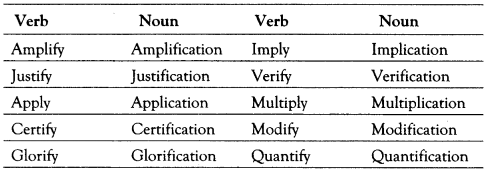
2. ation
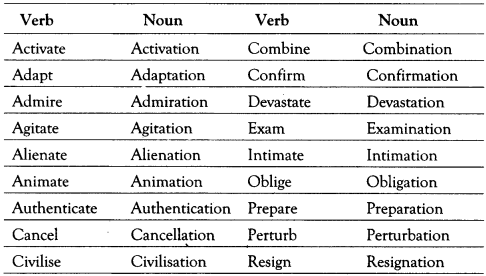
3. ment
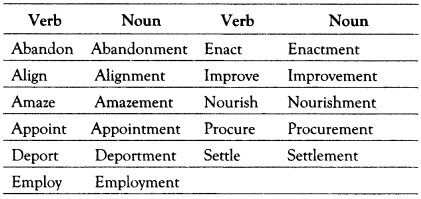
4. ure

5. ance
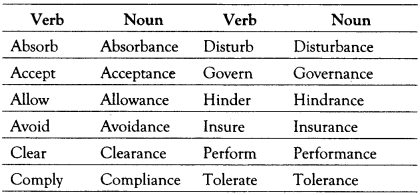
6. ion
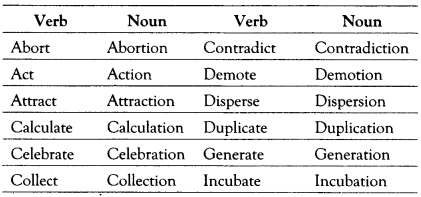
7. ence
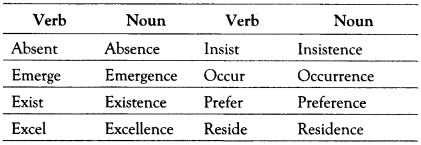
8. age
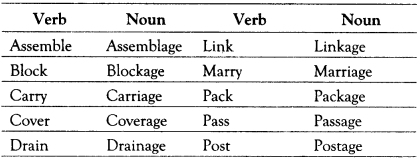
9. al

10. sion

Formation of Nouns from Adjectives
1. ness
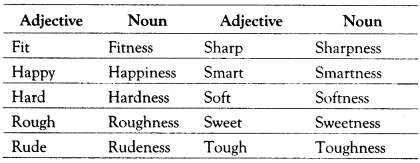
2. ry

3. th

4 ity
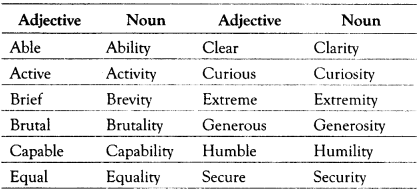
5. ty

6. ‘nt’ changes to ‘nce’
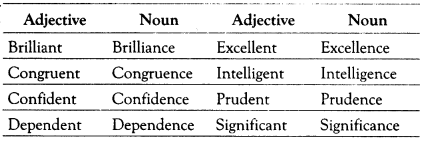
Formation of Nouns from Common Nouns
1. by adding ‘hood’

2. by adding ‘ship’

3. by adding ‘ry’

Transforming a Verb in a Sentence into its Noun Form
A noun can be a subject or an object in a sentence. Therefore, when we are changing the ‘verb’ in a sentence into its ‘noun’ form, we need to provide another verb that may suit the context of the sentence and that may not harm its syntax as well as its meaning.
Let us consider following examples to learn this phenomenon:
• You need to justify your answer.
If we have been asked to use the noun form of the verb ‘justify’, i.e. ‘justification’, then the sentence will be :
• You need to give justification of your answer.
Or
• Your answer needs justification.
You can understand that both the sentences have the same meaning as the original sentence. But the syntax of both of them is different.
Therefore, if you comprehend the sentence with the context with which the words are used, you will be able to change their construction using different parts of speech.
Some More Examples:
• The bright and intelligent youth of the country can glorify her.
The bright and intelligent youth of the country can lead her to glorification.
Or
The bright and intelligent youth of the country can bring glorification to her.
• This plan needs to be modified.
This plan needs modification.
• The company agreed to provide one-time food.
The company made an agreement to provide one-time food.
• Venu went to cancel the tickets.
Venu went for the cancellation of tickets. (Preposition ‘to’ changed to ‘for’ in order to suit ‘noun’)
• The gardener examined the plants carefully.
The gardener made a careful examination of the plants, (the ‘adverb’ also changed to ‘adjective’ in order to define noun)
• Sanyukta has prepared everything nicely.
Sanyukta has done a nice preparation of everything.
(you also need to supply a suitable article for noun).
• Vitamins and minerals nourish our body.
Vitamins and minerals provide nourishment to our body.
• They want to settle this issue.
They want a settlement of this issue.
• The king announced to celebrate the victory.
The king announced the celebration of the victory.
• Your words contradict your gestures.
There is a contradiction between your words and your gestures.
Transforming an Adjective in a Sentence into its Noun form
Consider the following example:
• The little boy gave a brave performance.
We know that an adjective qualifies a noun. So, when we change adjective into abstract noun, the noun which is being qualified by it, must either change its position or be provided with a suitable preposition to receive its effect.
Sometimes, another suitable ‘verb’ also needs to be supplied in order to complete the sense of the sentence.
The above sentence can be rewritten as:
• The little boy exhibited bravery in his performance.
Or
The little boy’s performance exhibited bravery.
Some More Examples
• They led a happy life.
They led their life with happiness.
• The nurse devoted a warm care to the patients.
The nurse devoted a care with warmth to the patients.
• How wide is the path?
What is the width of the path?
• Granny was always generous to her grandchildren.
Granny always showed generosity for her grandchildren.
• Alok’s words are not clear.
There’s no clarity in Alok’s words.
• They are menaced by being poor.
They are menaced by poverty.
• Nobody can tolerate such a brutal act.
Nobody can tolerate such an act of brutality.
• The two lines are exactly congruent to each other.
There is an exact congruence between the two lines.
• Shilpa behaved in a humble manner.
There was a humility in Shilpa’s behaviour.
• Sagar is confident enough to win the gold.
Sagar has enough confidence to win the gold.
Nominalisation Worksheets
1. Rewrite the following sentences according to the instructions given after each. Make other changes that may be necessary but do not change the meaning of each sentence.
Question 1.
He was preparing with full enthusiasm for IAS Examination.
(Rewrite using the word ‘preparation’)
Answer:
His preparation for IAS Examination was going on with full enthusiasm.
Question 2.
We have an obligation to do our best.
(Rewrite using ‘oblige’ in your own sentence)
Answer:
We are obliged to do our best.
Question 3.
Latest intimation on the capture of the suspect was given to media.
(Rewrite using ‘intimate’ in your sentence)
Answer:
The media was intimated about the latest news on the capture of the suspect.
Question 4.
His resignation was not accepted by the Governor.
(Rewrite using ‘resign’)
Answer:
When he resigned, it was not accepted by the Governor.
Question 5.
Closure time of the market has been shortened by one ’ hour.
(Rewrite using word ‘close’)
Answer:
The market will be closed one hour earlier from the scheduled time.
Question 6.
The animals were kept in the enclosure to keep them safe from outside disturbances.
(Rewrite using the word ‘enclose’)
Answer:
The animals were enclosed to save them from outside disturbances.
Question 7.
The fraud by the company was exposed to police.
(Use the word ‘exposure’ in a sentence)
Answer:
The exposure of the fraud by the company was done by the police.
Question 8.
The failure to file IT Returns may lead to fine and punishment.
(Rewrite using the word ‘fail’)
Answer:
If you fail to file IT Returns, you may be fined or punished.
Question 9.
The Pleasures of Reading are not felt by todays’ young generation.
(Rewrite using ‘please’)
Answer:
Today’s young generation is not pleased by reading a book or novel.
Question 10.
Rohan was watching the circus show in amazement.
(Rewrite using the word ‘amaze’)
Answer:
Rohan was amazed to watch the circus show.
2. Rewrite the following sentences according to the instructions given after each. Make other changes that may be necessary but do not change the meaning of each sentence.
Question 1.
The property dispute could not be settled amicably.
(Rewrite using the word ‘settlement’)
Answer:
The amicable settlement of the property dispute could not be done.
Question 2.
The governors are appointed by the President of India.
(Rewrite using the word ‘appointment’)
Answer:
The appointment of governors is done by the President of India.
Question 3.
The procurement of wheat is not required at present.
(Use the word ‘procure’)
Answer:
We do not need to procure wheat at present.
Question 4.
This enactment of the new law required a referendum in the entire state.
(Rewrite using the word ‘enact’)
Answer:
A referendum in the entire state was required to enact the new law.
Question 5.
The trade fair attracts thousands of visitors from all over India.
(Rewrite using the word ‘attraction’)
Answer:
The attraction of trade fair results in thousands of visitors to the fair from all over India.
Or
The trade fair causes attraction of thousands of visitors from all over India.
Question 6.
The collections of the party fund was going at a low speed.
(Rewrite using the word ‘collect’)
Answer:
Party fund was being collected at a very low speed.
Question 7.
Nobody appreciated the honest officer’s demotion.
(Rewrite using the word ‘demote’)
Answer:
To demote an honest officer was a matter of no one’s appreciation.
Question 8.
His actions are a matter of serious concern.
(Rewrite using the word ‘act’)
Answer:
How he acts is a matter of serious concern.
Question 9.
Seeds get dispersed with the help of wind and birds.
(Rewrite using the word ‘dispersion’)
Answer:
Wind and birds help in the dispersion of seeds.
Question 10.
Our existence on this Earth is very limited.
(Rewrite using the word ‘exist’)
Answer:
We exist on this Earth for a very limited time.
3. Rewrite the following sentences according to the instructions given after each. Make other changes that may be necessary but do not change the meaning of each sentence.
Question 1.
Please do not insist upon my being present in the party tomorrow.
(Rewrite using the word ‘presence’)
Answer:
Please do not insist upon my presence in the party tomorrow.
Question 2.
He excelled as a voice-trainer in the company and was well rewarded.
(Use the word ‘excellence’ and rewrite the sentence)
Answer:
He was well rewarded for his excellence as a voice-trainer in the company.
Question 3.
My preferance of coffee to tea is known to everyone.
(Rewrite using the word ‘prefer’)
Answer:
Everyone knows that I prefer coffee to tea.
Question 4.
My residence is a rented one.
(Rewrite using the word ‘reside’)
Answer:
I reside in a rented accomodation.
Question 5.
If he accepts his crime, he might be convicted.
(Rewrite using the word ‘acceptance’)
Answer:
His acceptance of his crime will lead to his conviction.
Or
On his acceptance of his crime, he might be convicted.
Question 6.
How he performs in this competitive exam will make a great difference.
(Rewrite using the word ‘performance’)
Answer:
His performance in this competitive exam will make a great difference.
Question 7.
Too many flights at one time delay the clearance procedure.
(Rewrite using the word ‘clear’)
Answer:
It becomes difficult to clear too many flights at one time.
Question 8.
Most of the staff was absorbed in the new company.
(Rewrite using the word ‘absorbance’)
Answer:
The new company brought about the absorption of most of the staff.
Question 9.
Daily allowance of ₹ 200 is too less to survive.
(Rewrite using the word ‘allow’)
Answer:
To allow to spend only ₹ 200 a day is very less.
Or
It is very difficult to survive if we are allowed to spend only ₹ 200 a day.
Question 10.
The committee’s disapproval of OROP will ignite more agitation.
(Rewrite using ‘disapprove’)
Answer:
More agitations will be ignited if the committee disapproves OROP.
4. Rewrite the following sentences according to the instructions given after each. Make other changes that may be necessary but do not change the meaning of each sentence.
Question 1.
The minister dismissed the complaint suggesting it was done to damage his reputation.
(Rewrite using the word ‘dismissal’)
Answer:
The minister expressed dismissal of the complaint saying that it was done to damage his reputation.
Question 2.
Our ‘survival’ depends on our skills.
(Rewrite using the word ‘survive’)
Answer:
Skills are required to survive.
Question 3.
The convict was asked to appear before the court for his trial in robbery case.
(Rewrite using the word ‘try’)
Answer:
The court wanted to try the convict in the robbery case.
Question 4.
The public and the media proposed to continue the discussion.
(Rewrite using the word ‘proposal’)
Answer:
The proposal by media and the public was to continue the discussion.
Question 5.
The student was not permitted to sit for examination due to very low attendance.
(Rewrite using ‘permission’)
Answer:
The permission to sit for examination was not given to the student because of very low attendance.
Question 6.
Omission of a few passages from the text was brought to the editor’s notice.
(Rewrite using the word ‘omit’)
Answer:
The editor was informed that a few passages were omitted from the text.
Question 7.
Delhi University has made the admission procedure very cumbersome for new students.
(Rewrite using the word ‘admit’)
Answer:
Delhi University has made the produce to admit new students very cumbersome.
Question 8.
The demand for concessions was rejected by the committee.
(Rewrite using the word ‘concede’)
Answer:
Committee did not concede for any concessions.
Question 9.
Submission of bail papers was not done in time so he had to stay in lock up for a day.
(Use ‘submit’ instead and frame a sentence)
Answer:
He had to stay in the lock up for a day as he could not submit the bail papers on time.
Question 10.
Her attitude often annoys me.
(Rewrite using‘annoyance’)
Answer:
Her attitude often causes annoyance to me.
5. Rewrite the following sentences according to the instructions given after each. Make other changes that may be necessary but do not change the meaning of each sentence.
Question 1.
His arrogance was the cause of his losing the election.
(Rewrite the sentence using the word ‘arrogant’)
Answer:
He lost the election because he was arrogant.
Question 2.
She was the only person capable of being house captain.
(Use : capability)
Answer:
She was the only person who had the capability of being house captain.
Question 3.
He does not intend to leave the company.
(Use : intention)
Answer:
He has no intention of leaving the company.
Or
He has no intention to leave the company.
Question 4.
It doesn’t matter which chemical you put into the mixture first, the results will be the same.
(Use : difference)
Answer:
It doesn’t make any difference which chemical you put into the mixture first, the results will be the same.
Question 5.
The teacher forgave the student who had misbehaved with her and it was welcomed by all.
(Rewrite using ‘forgiveness’)
Answer:
The teacher’s forgiveness to the student who had misbehaved with her, was welcomed by all.
Question 6.
She could never accept the fact of being betrayed by him.
(Rewrite using ‘betrayal’)
Answer:
She could never accept the fact of betrayal by him.
Question 7.
Swara hesitated much to tell her that she irritated her by stupid questions.
(Use ‘irritation’)
Answer:
Swara hesitated much to tell her that her stupid questions caused her irritation.
Question 8.
Sandhya always wanted to go for lectureship.
(Rewrite using ‘lecturer’)
Answer:
Sandhya always Wanted to become a lecturer.
Question 9.
Our lives were devoid of any difficulties when we were children.
(Use ‘childhood’)
Answer:
In our childhood, our lives were devoid of any difficulties.
Or
Our childhood lives were devoid of any difficulties.
Question 10.
The minarets of the ‘Char Minar’ are 48.7 metres high.
(Use ‘height’)
Answer:
The height of the minarets of the ‘Char Minar’ is 48.7 metres.